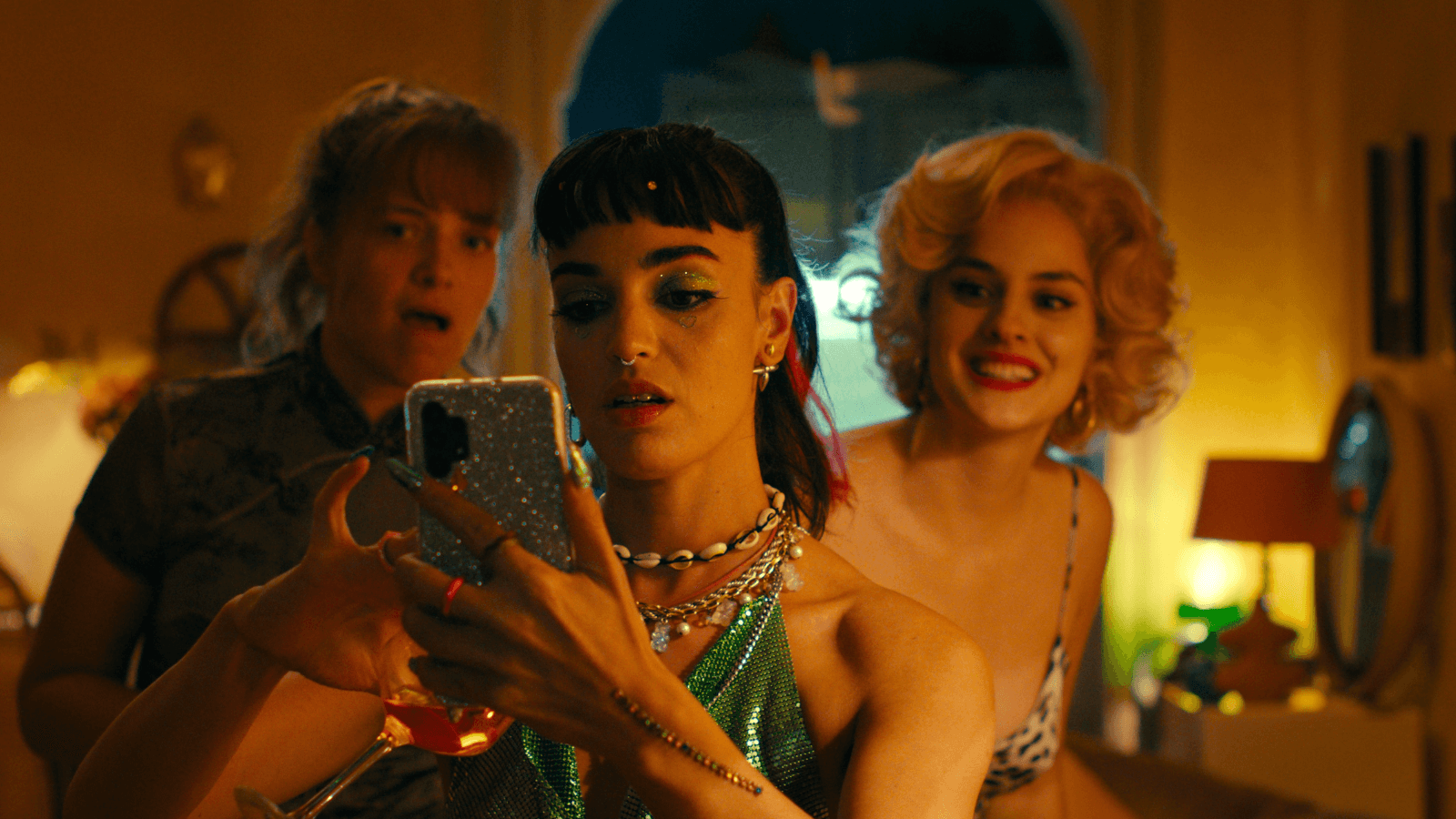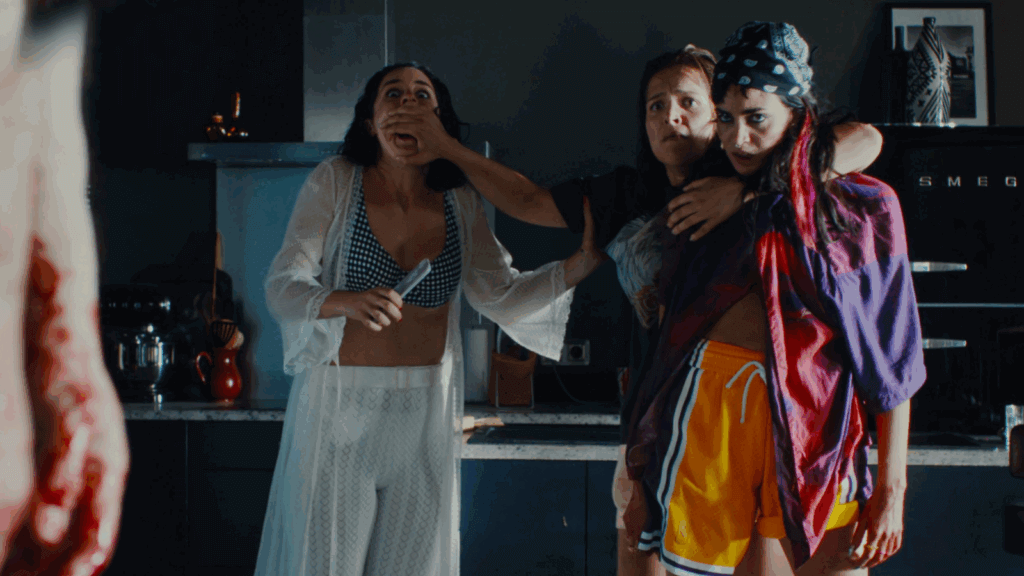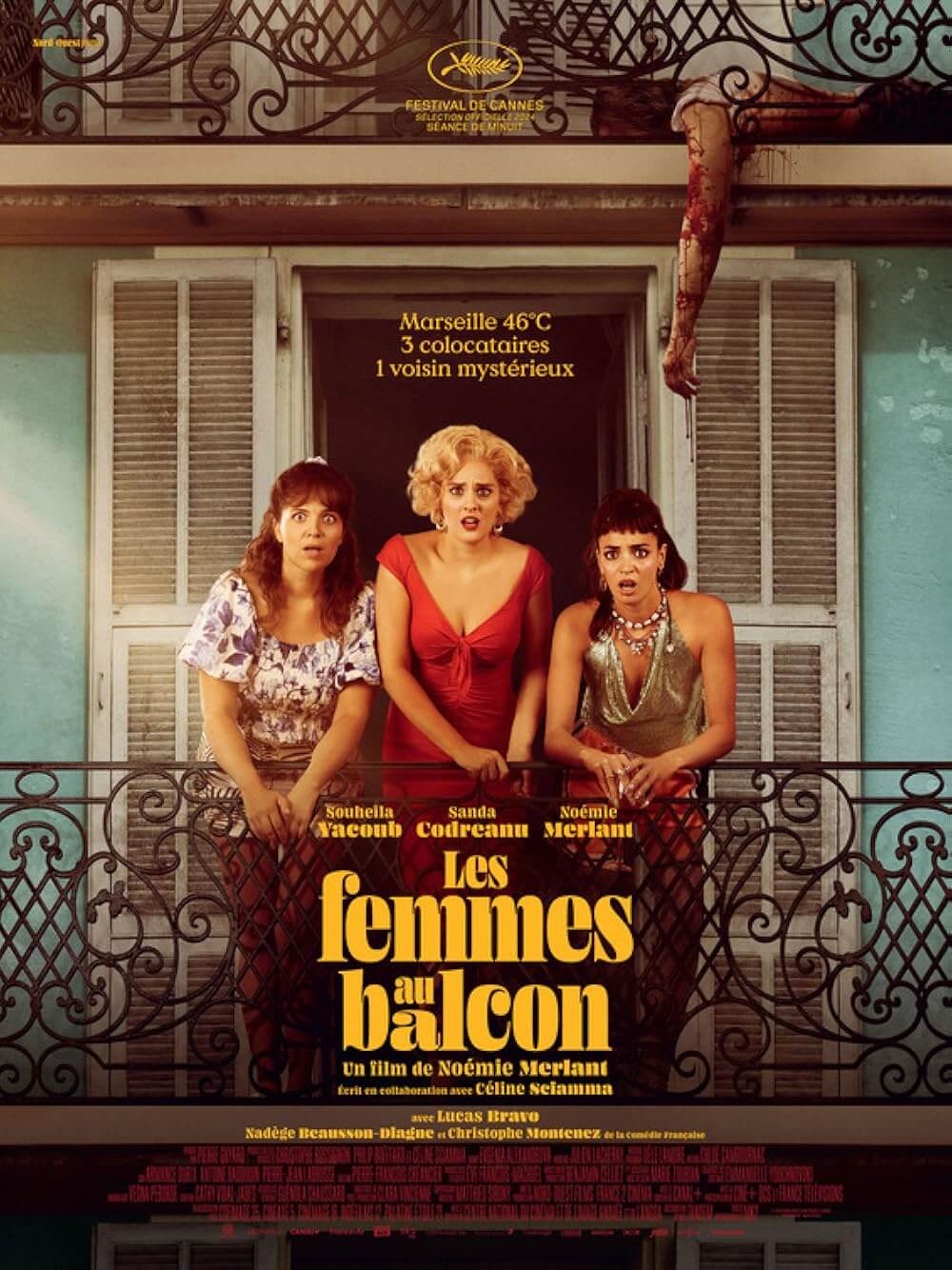
The Balconettes
By Brian Eggert |
Sometimes a movie can be tonal chaos and still work despite its oddball choices. In fact, that quality can be a plus. The Balconettes (Les femmes au balcon) is such a movie. It’s the second feature directed by French actress Noémie Merlant, who is probably best known for her role in Portrait of a Lady on Fire (2019), helmed by Céline Sciamma, who receives credit here as co-writer and producer. Merlant’s rape-revenge story with a supernatural bent offers a welcome evisceration of toxic masculinity and a celebration of solidarity among women, both contained within a macabre comedy that counteracts its serious themes with madcap verve. It plays like a kookier version of Pedro Almodóvar’s Volver (2006), another film about women confronting the men in their lives, and with a similar application of vibrant colors, grim humor, and transgressive glee. An ambitious sophomore effort, The Balconettes finds Merlant experimenting with a variety of tones and stylistic modes without losing focus on her thematic and narrative throughlines.
The first sequence is a microcosm of things to come. Set on a sweltering summer day in Marseille, a fluid opening shot looks out upon the sweaty locals cooling themselves on their balconies, reminiscent of establishing shots in Rear Window (1954). And it’s among the film’s many impressive sequences captured by cinematographer Evgenia Alexandrova, who, along with editor Julien Lacheray, digitally piece together camera movements for extended oners. When the camera finally settles on Denise (Nadège Beausson-Diagne), she’s about to stand up to her abusive husband, a wife-beating slob who soon meets his demise. Retaliating, Denise cracks his skull with a metal dustpan, and then she smothers him by putting a towel over his face and sitting on it. The scene establishes a pattern of things to come, where abused women fight back, leaving a no-big-loss string of dead abusers in their wake.
However, Denise is peripheral to the central story, which involves three friends, two of whom live in the apartment next door. The somewhat reserved journalist and author, Nicole (Sanda Codreanu), lives in a bohemian space with her uninhibited roommate, Ruby (Souheila Yacoub), a camgirl whose sex-positive worldview defiantly welcomes gawkers. When their actress friend Élise (Merlant) arrives in a frenzy, her car accidentally bumps into the vintage car belonging to Magnani (Lucas Bravo), a hunky photographer who lives across the street and often gazes over at Ruby. He suggests that Élise might make amends by the three of them coming over to his place for a drink. After some tipsy dancing, Ruby resolves to stay behind and take Magnani up on his offer of a professional photo shoot, and things go south. Later that night, after her friends have gone home and passed out, Ruby returns home, catatonic and covered in blood. Nicole and Élise soon find Magnani dead in his apartment, his body impaled on a tall camera light tripod and the tip of his penis missing.

From here, it’s a race to clean up and dispose of the body, while also maintaining the outward appearance of normality. It doesn’t help that the photographer’s ghost appears to Nicole and haunts her, his skin gray, the hole in his stomach gaping. Other predatory men trapped in ghost form join him and remain incapable of admitting their wrongdoing, defending their behavior with the typical “she wanted it” rationalizations. But this behavior is not exclusive to ghosts. Élise’s creeper husband, Paul (Christophe Montenez), represents the reality of sexual assault in relationships and marriage, just as Ruby’s provocative dress highlights how clothing does not justify unwanted advances. Merlant’s film adopts a fourth-wave feminist outlook that yearns for women to have the freedom to express themselves and love their bodies without fear of shaming and sexual assault.
At once horrific and hilarious, sensitive and furious, The Balconettes constantly destabilizes the viewer. Every other scene adopts a new mood, ranging from slapstick to sobering, and keeping up with these shifts requires an openness to their modulations. This is not a complaint; rather, it’s a note of admiration. Amid these switches, Merlant seems to be having fun finding the sisterhood among women who must chop up and dispose of an abuser’s body (and they aren’t the only women in Marseille having to do this). The crammed movie continues to reveal new facets. Some of them, such as the ghost subplot, feel underdeveloped and unbound by the usual supernatural movie rules. Another one involving Élise’s visits to the doctor for a pregnancy test and eventual abortion pill captures the rather uncomfortable and dehumanizing effect when the doctor, particularly when it’s a man, treats a woman for a gynecological exam like she’s a specimen. The visuals match the varied tonality with a blend of elaborate extended shots, a wobbly handheld style, and tilted angles that keep the viewer scrambling to keep up.
The Balconettes is a bold and unrestrained feature, and Merlant no doubt learned much from her experience working for directors who take bold risks by recalibrating the audience’s expectations every few minutes. Besides Sciamma, she has collaborated with Jacques Audiard (Paris, 13th District, 2021), Todd Field (Tár, 2022), and Audrey Diwan (Emmanuelle, 2025), who have challenged their audiences with boundary-pushing subject matter and unconventional formal techniques. Like them, her direction proves nimble, even experimental—as opposed to undisciplined—in its variety. She also commands some superb efforts behind the camera, particularly Chloé Cambournac’s vivid production design and Uèle Lamore’s music. If some moments can feel silly or over-the-top, others prove disquieting, leading to a message about how a woman expressing her sexuality isn’t an invitation to men or a form of consent. However chock full of ideas it may be, The Balconettes exudes a relentless, infectious energy and passion that holds promise for Merlant’s continued work as a director.
(Editor’s Note: This review has been corrected to attribute The Balconettes as Noémie Merlant’s second feature film as director.)

Thank You for Supporting Independent Film Criticism
If the work on DFR has added something meaningful to your love of movies, please consider supporting it.
Here are a few ways to show your support: make a one-time donation, join DFR’s Patreon for access to exclusive writing, or show your support in other ways.
Your contribution helps keep this site running independently. However you choose to support the site, please know that it’s appreciated.
Thank you for reading, and for making this work possible.
Brian Eggert | Critic, Founder
Deep Focus Review







